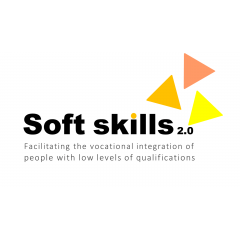
Soft Skills 2.0
After 3 years of collaborative work around a first Erasmus+ project on Soft Skills entitled "Soft skills", it is by mutual agreement that WORK'INN and 6 of its Austrian, Spanish, French, Belgian and Slovenian partners have decided to deepen the work done and to apply for this second Eramsus + project. After having developed a Soft Skills list, a classroom training program and a placement and assessment protocol linked to this training, the partners now want to focus on on-the-job training and recruitment and management processes within companies and propose transferable tools to include Soft Skills in the culture of European companies. As we know, Soft Skills are a combination of social and relational skills, communications, personality traitś and attitudes that complement technical skills. Today, these Soft Skills are highly sought after by recruiters (between 70 and 89% depending on the European country) and research shows that 85% of professional success comes from social and relational skills developed over the years. HR personnel and companies no longer consider Soft Skills as a fad and want to implement dedicated training and integrate these skills in their recruitment and management processes. As the naturalist Charles Darwin said, "It is not the strongest of the species that survives, nor the most intelligent, but the one that best adapts to change". Soft skills are precisely the best way to adapt to change and their recognition and valorisation offer many opportunities: whatever the professional qualification, whatever the job, the usefulness of soft skills is universal and transferable; soft skills will add a winning asset to your application and it is their identification that will make the difference on the job market or within a company. Assessing and valuing soft skills and their progress in a work situation in the form of a "badge" or micro accreditation by working on observable behaviors is becoming essential to support professional development and recruitment. Offering on-the-job training and giving keys to trainers/tutors/recruiters and HR personnel to integrate Soft Skills into their work habits therefore seems to be complementary and necessary. In addition to the existing classroom training, we would like to offer a Workplace Training Program (WTP) related to the 20 soft skills identified in our first project and transferable to any company. We see this training as a real added value that responds to a need that is increasingly present in Europe; all the more so as FEST is considered as the "best soft skills development device" according to the 2020 Soft Skills Barometer. Offering tools to HR staff and recruiters to integrate soft skills in their management and recruitment processes seems to be a key element in the implementation of a soft skills corporate culture. The European partners wish to offer a more complete range of Soft Skills services to companies to meet their new recruitment and management challenges, but also their training needs. In short, you will have understood, the Soft Skills 2.0 partners want to collaborate to set up a Soft Skills corporate culture in Europe and to give all the keys so that companies appropriate them.